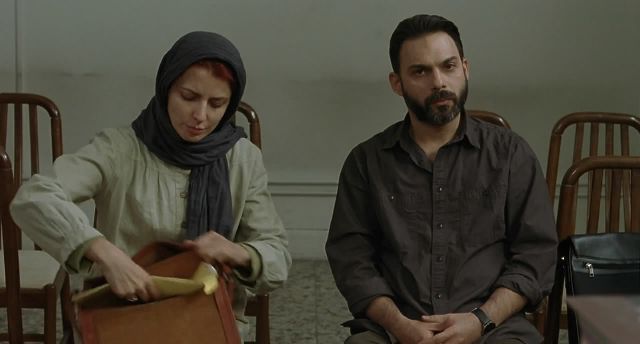A Separation (2011) 
“Lies may lead to truth.”

Director: Asghar Farhadi
Cast: Peyman Moaadi, Leila Hatami, Sareh Bayat
Synopsis: A married couple are faced with a difficult decision – to improve the life of their child by moving to another country or to stay in Iran and look after a deteriorating parent who has Alzheimer’s disease.
Differing cultural conventions aside, it seems that marital strife differs little from country to country if Asghar Farhadi’s superb A Separation is anything to go by. Dispensing with establishing shots or any kind of view beyond the immediate environment of its characters, the movie initially looks as if it will be a dissection of the problems in the marriage of Nader (Payman Maadi) and Simin (Leila Hatami), a modern Iranian couple. We first meet them as they each argue their case to a judge who must decide whether they have justifiable reasons for divorcing. Having obtained an exit visa, Simin wants to take their eleven-year-old daughter (Sarina Farhadi) — although she appears older, both physically and mentally, than that age — abroad, where she can enjoy a better standard of life. But Nader doesn’t want to leave his elderly father (Ali-Asghar Shahbazi) who is suffering from Alzheimer’s. It’s an understandable objection, and to be honest Simin comes across as a little selfish when she refuses to take her husband’s concerns for his father into consideration. It’s at this point, when outside forces come into play, that the story broadens its scope to embrace a host of intriguing themes which pretty much all boil down to our responses to, and misconception of, the human condition.
When Simin leaves Nader, their daughter chooses to remain with her father, who employs Razieh (Sareh Bayat) to care for his own father during the day. However, Nader returns home from work one day to discover his father unconscious on the floor with one arm tied to the trolley which carries his oxygen bottles. The carer has left him alone and, upon her return, refuses to explain why. When Nader also discovers money missing from a chest of drawers, he accuses Razieh of the theft and forcibly ejects her from his flat. Later, Nader learns that she is in hospital after suffering a miscarriage, and that she is claiming he pushed her down the stairs of the apartment block.
What A Separation does very well is to demonstrate that in life there are few wholly good or bad people, and that unsavoury situations can be triggered by misjudged, and sometimes even well-meaning, actions. Those who appear decent and altruistic are capable of deceit if they believe they are acting in the best interests of those they care for, and a decent person who suffers injustice may resort to deceit in order to redress the balance. The actions of others whose behaviour might at first glance appear selfish, may likewise be driven by the best of intentions. But when people’s motives become muddied, and accusations replace conversations, conflict is inevitable — even when those involved both desire the same outcome. The breakdown of Nader and Simin’s marriage drives a wedge, not only between the couple, but between each of them and their daughter, and it is heart-breaking to see them drifting apart as they negotiate the same turbulent seas, even as they each painfully try to move in the same direction.
A Separation’s riveting story of domestic upheaval plays like a thriller at times, with unexpected twists and turns which, in an instant, cast characters in a different light to that in which we had previously seen them. Farhadi somehow manages to do this without making his characters less credible or believable, and despite the tension and conflict between them, skilfully elicits audience sympathy for all of the protagonists. This is no mean feat when you think about it, especially when some of them, such as Razieh‘s long-term unemployed husband, are mainly seen in a negative light.
httpv://www.youtube.com/watch?v=KfuM_v15v-o
